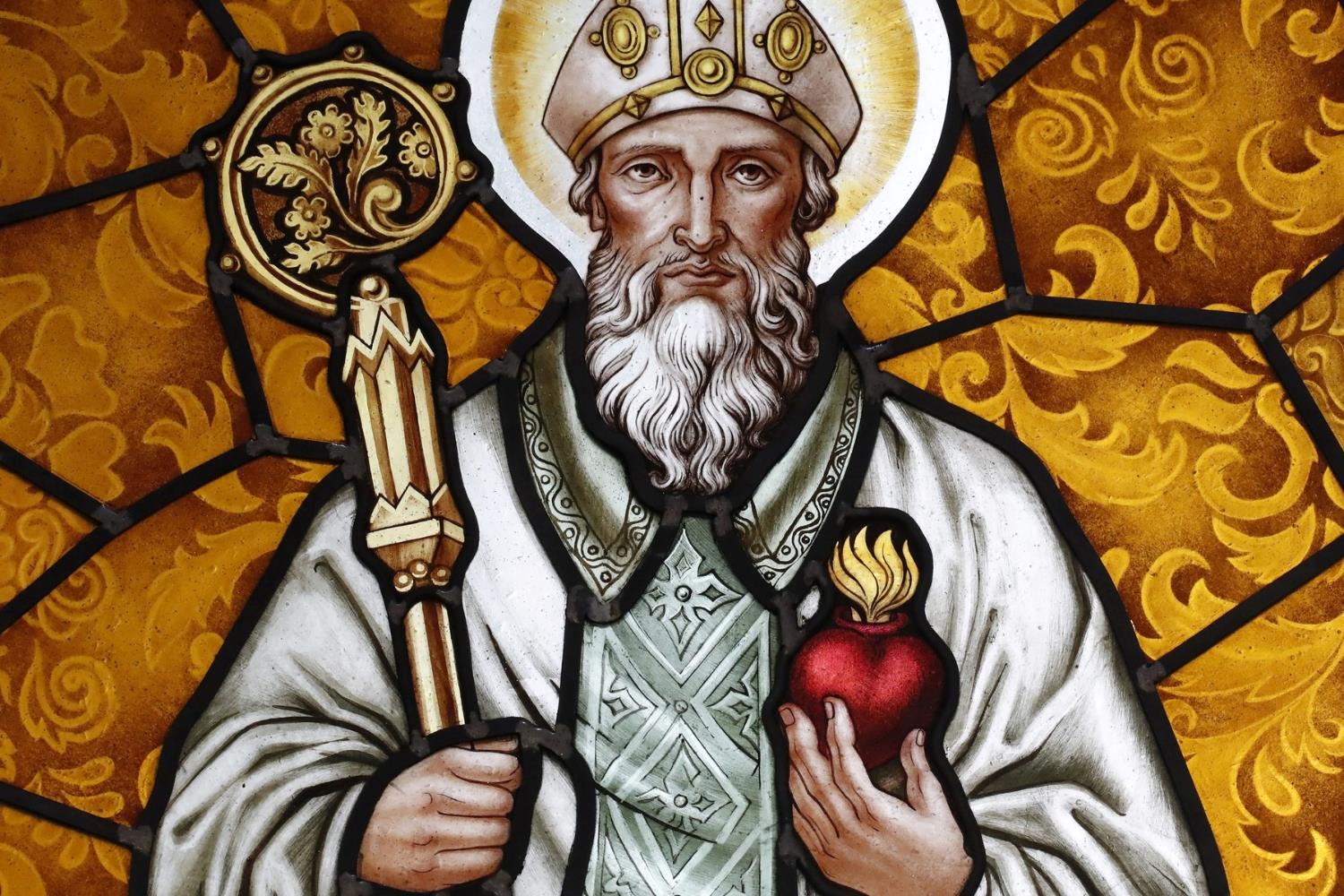Home>Theology and Spirituality>Who Is Saint John The Baptist


Theology and Spirituality
Who Is Saint John The Baptist
Published: February 22, 2024
Peter Smith, Editorial Director at Christian.net, combines deep insights into faith, politics, and culture to lead content creation that resonates widely. Awarded for his contributions to religious discourse, he previously headed a major organization for religious communicators, enhancing dialogue on faith's societal impacts.
Discover the significance of Saint John the Baptist in theology and spirituality. Learn about his life, teachings, and influence in Christian tradition. Explore the enduring legacy of this revered figure.
(Many of the links in this article redirect to a specific reviewed product. Your purchase of these products through affiliate links helps to generate commission for Christian.net, at no extra cost. Learn more)
Table of Contents
Introduction
Saint John the Baptist, a revered figure in Christianity, is known for his pivotal role in preparing the way for the ministry of Jesus Christ. His life and teachings have left an indelible mark on the spiritual landscape, inspiring countless individuals to seek repentance and embrace a life of faith.
Born in the 1st century AD, John the Baptist emerged as a prophetic voice in the Judean wilderness, heralding the imminent arrival of the Messiah. His unwavering commitment to righteousness and his call for spiritual renewal resonated deeply with the people of his time, drawing multitudes to the banks of the Jordan River to partake in his baptism of repentance.
As we delve into the life of Saint John the Baptist, we are invited to explore the profound impact of his ministry, his unwavering dedication to his divine calling, and his profound influence on the early Christian community. Through his fearless proclamation of truth and his embodiment of humility, John the Baptist continues to serve as a timeless exemplar of faith and devotion.
In this comprehensive exploration, we will journey through the various facets of John the Baptist's life, from his early years and family background to his profound relationship with Jesus Christ. We will also delve into the circumstances surrounding his imprisonment and eventual martyrdom, as well as the enduring legacy he has left for generations to come.
Join us as we embark on a captivating journey through the life and legacy of Saint John the Baptist, a figure whose unwavering faith and profound impact continue to resonate with believers around the world.
Read more: When Is The Feast Of Saint John The Baptist
Early Life and Family
John the Baptist's early life and family background provide valuable insights into the formative years of this revered figure. According to biblical accounts, John was born to elderly parents, Zechariah and Elizabeth, both of whom hailed from priestly lineages. Despite their advanced age and Elizabeth's initial barrenness, their fervent prayers were answered when she conceived John, a miraculous event that foreshadowed his extraordinary destiny.
Growing up in the hill country of Judea, John experienced a childhood marked by divine favor and spiritual calling. His upbringing was deeply rooted in the traditions of Judaism, and he likely received a comprehensive education in the scriptures and religious practices. As he matured, John's innate sense of purpose and devotion to God became increasingly evident, setting the stage for his future role as a prophetic voice in the wilderness.
The familial bond between John and his parents, Zechariah and Elizabeth, undoubtedly played a pivotal role in shaping his character and spiritual disposition. Their unwavering faith and commitment to God's plan served as a guiding light for John, instilling in him a profound reverence for the divine and a deep sense of duty to fulfill his calling.
The unique circumstances surrounding John's birth, coupled with the righteous example set by his parents, undoubtedly contributed to the development of his unwavering faith and resolute character. These early influences laid the foundation for John's eventual emergence as a fearless herald of repentance and a beacon of hope for those seeking spiritual renewal.
As we reflect on John the Baptist's early life and family dynamics, we gain a deeper appreciation for the providential orchestration of events that culminated in his extraordinary ministry. The love, faith, and spiritual heritage instilled in him during his formative years undoubtedly played a profound role in shaping his identity as a prophetic voice and forerunner of the Messiah.
In the next section, we will delve into the pivotal moments of John's ministry and his compelling message of repentance, shedding light on the profound impact of his teachings on the hearts and minds of those who encountered him.
Ministry and Preaching
John the Baptist's ministry and preaching were characterized by a fervent call to repentance and a profound commitment to preparing the hearts of the people for the imminent arrival of the Messiah. Venturing into the Judean wilderness, he fearlessly proclaimed a message of spiritual renewal, urging individuals to turn away from sin and embrace a life of righteousness.
At the heart of John's ministry was the ritual of baptism, symbolizing the cleansing of one's sins and the readiness to embark on a transformed spiritual journey. Multitudes flocked to the banks of the Jordan River, drawn by John's compelling exhortations and his unwavering dedication to his divine mission. His austere lifestyle and uncompromising message resonated deeply with the masses, transcending social barriers and stirring the hearts of all who encountered him.
John's preaching was marked by a potent blend of urgency and compassion, as he fervently implored the people to prepare for the arrival of the long-awaited Messiah. His prophetic proclamation echoed the words of the ancient prophets, igniting a sense of anticipation and spiritual awakening among those who longed for the fulfillment of God's promises.
In addition to his vocal exhortations, John's life exemplified humility and selflessness, serving as a powerful testament to the transformative power of genuine repentance. His unwavering commitment to righteousness and his willingness to confront societal injustices embodied the very essence of his message, inspiring others to embrace a renewed dedication to God and their fellow human beings.
As John's influence continued to spread, his ministry intersected with individuals from all walks of life, including tax collectors, soldiers, and religious leaders. His bold call to repentance transcended societal distinctions, inviting all to partake in the transformative experience of spiritual rebirth.
Through his compelling preaching and unwavering commitment to his divine calling, John the Baptist laid the groundwork for the ministry of Jesus Christ, preparing the hearts of the people to receive the message of salvation and grace. His resounding call to repentance continues to echo through the corridors of time, inviting individuals to embrace a life of spiritual renewal and prepare for the imminent arrival of the Messiah in their own lives.
In the subsequent section, we will delve into the profound relationship between John the Baptist and Jesus Christ, shedding light on the transformative encounter that would forever intertwine their destinies.
Relationship with Jesus
The relationship between John the Baptist and Jesus Christ transcends mere historical association; it embodies a profound intertwining of destinies that would forever shape the course of their respective ministries. As cousins, their connection extended beyond familial ties, encompassing a divine purpose that would unfold with transcendent significance.
The pivotal moment of their interaction unfolded at the Jordan River, where John was fulfilling his ministry of baptism. As Jesus approached him, John recognized the profound spiritual reality encapsulated in his cousin and uttered the iconic words, "Behold, the Lamb of God, who takes away the sin of the world!" This profound declaration encapsulated the essence of Jesus' redemptive mission and affirmed John's role as the forerunner who heralded the arrival of the long-awaited Messiah.
The encounter at the Jordan River marked a transformative juncture in both their lives, signifying the divine affirmation of their intertwined destinies. John, in his humility, recognized the surpassing nature of Jesus' ministry and willingly yielded to the unfolding of God's redemptive plan. His acknowledgment of Jesus as the Lamb of God underscored the profound spiritual insight he possessed, affirming the fulfillment of ancient prophecies and the dawning of a new era of salvation.
As Jesus' ministry commenced, John's unwavering support and acknowledgment of his divine identity served as a powerful testament to the authenticity of Christ's mission. Despite the inevitable decrease in his own prominence as Jesus gained increasing recognition, John embraced his role with humility and unwavering devotion, affirming, "He must increase, but I must decrease."
The relationship between John the Baptist and Jesus Christ exemplifies a profound intertwining of destinies, characterized by humility, mutual affirmation, and a shared commitment to fulfilling God's redemptive plan. Their connection transcended earthly kinship, embodying a spiritual bond that reverberates through the annals of Christian history, inspiring believers to embrace their own roles in preparing the way for the transformative work of the Messiah.
In the subsequent section, we will delve into the harrowing circumstances surrounding John the Baptist's imprisonment and eventual martyrdom, shedding light on the enduring legacy of his unwavering faith and unyielding commitment to truth.
Imprisonment and Death
The latter phase of John the Baptist's life was marked by adversity and persecution, culminating in his unjust imprisonment and eventual martyrdom. His unwavering commitment to truth and righteousness incurred the wrath of Herod Antipas, the ruler of Galilee, whose illicit relationship with Herodias, his brother's wife, drew John's vocal condemnation.
Imprisoned in the fortress of Machaerus, John faced the desolation of confinement, yet his spirit remained unbroken. Despite the confines of his physical captivity, his unwavering faith and resolute commitment to his divine calling continued to shine brightly. Even in the depths of his confinement, John's unwavering conviction and steadfast faith remained unyielding, serving as a beacon of hope for those who revered him.
The circumstances surrounding John's imprisonment were further complicated by the intricate web of political intrigue and personal vendettas that characterized the court of Herod Antipas. Herodias, resentful of John's outspoken rebuke, seized an opportune moment during a lavish banquet to orchestrate his demise. Prompted by her daughter's dance, Herodias manipulated Herod Antipas into ordering the execution of John the Baptist, despite his reluctance to do so.
The tragic end of John's life stands as a testament to the unyielding commitment to truth and righteousness that defined his ministry. His unwavering dedication to his divine calling, even in the face of persecution and imminent death, serves as an enduring example of steadfast faith and courage in the face of adversity.
The martyrdom of John the Baptist reverberates through the annals of Christian history, inspiring believers to embrace unwavering faith and resolute commitment to truth, even in the face of daunting opposition. His legacy endures as a poignant reminder of the profound sacrifices made in the pursuit of righteousness and the unwavering commitment to upholding the principles of divine truth, even in the face of overwhelming adversity.
In the subsequent section, we will delve into the enduring legacy and profound influence of John the Baptist, exploring the timeless impact of his life and ministry on the spiritual landscape of Christianity.
Read more: What Is St John The Baptist Patron Saint Of
Legacy and Influence
The enduring legacy of Saint John the Baptist transcends the confines of time, leaving an indelible imprint on the spiritual landscape of Christianity. His unwavering commitment to truth, his fearless proclamation of repentance, and his profound humility continue to inspire generations of believers, serving as a timeless testament to the transformative power of unwavering faith and resolute devotion to divine calling.
John the Baptist's influence extends far beyond the boundaries of his earthly ministry, resonating with individuals across diverse cultural and geographical contexts. His uncompromising message of repentance and spiritual renewal continues to reverberate through the corridors of time, inviting individuals to embrace a life of righteousness and prepare their hearts for the redemptive work of the Messiah.
The profound impact of John's ministry is evident in the countless lives transformed by his message, as well as in the enduring echoes of his prophetic voice in the annals of Christian history. His unwavering dedication to righteousness and his unyielding commitment to truth serve as a compelling example for believers, inspiring them to embrace a life of moral integrity and spiritual fervor.
Furthermore, John the Baptist's pivotal role in preparing the way for the ministry of Jesus Christ underscores the profound significance of his legacy. His unwavering acknowledgment of Jesus as the Lamb of God and his humility in yielding to the unfolding of God's redemptive plan exemplify the essence of servanthood and selfless devotion, leaving an indelible mark on the Christian ethos.
The enduring influence of John the Baptist is also evident in the artistic and cultural representations that have immortalized his legacy. From timeless works of art to musical compositions and literary masterpieces, his life and ministry continue to inspire creative expressions that capture the essence of his profound impact on the Christian faith.
As believers reflect on the enduring legacy of Saint John the Baptist, they are invited to embrace the timeless truths embodied in his life and ministry. His unwavering faith, his resolute commitment to righteousness, and his profound humility serve as a compelling call to embody the transformative power of genuine repentance and unwavering devotion to the divine calling.
In essence, the legacy of John the Baptist endures as a timeless beacon of hope and inspiration, inviting believers to embrace a life of unwavering faith, moral integrity, and profound humility. His profound influence continues to resonate with the hearts and minds of individuals, transcending the boundaries of time and culture, and leaving an indelible mark on the spiritual journey of all who encounter his enduring legacy.














